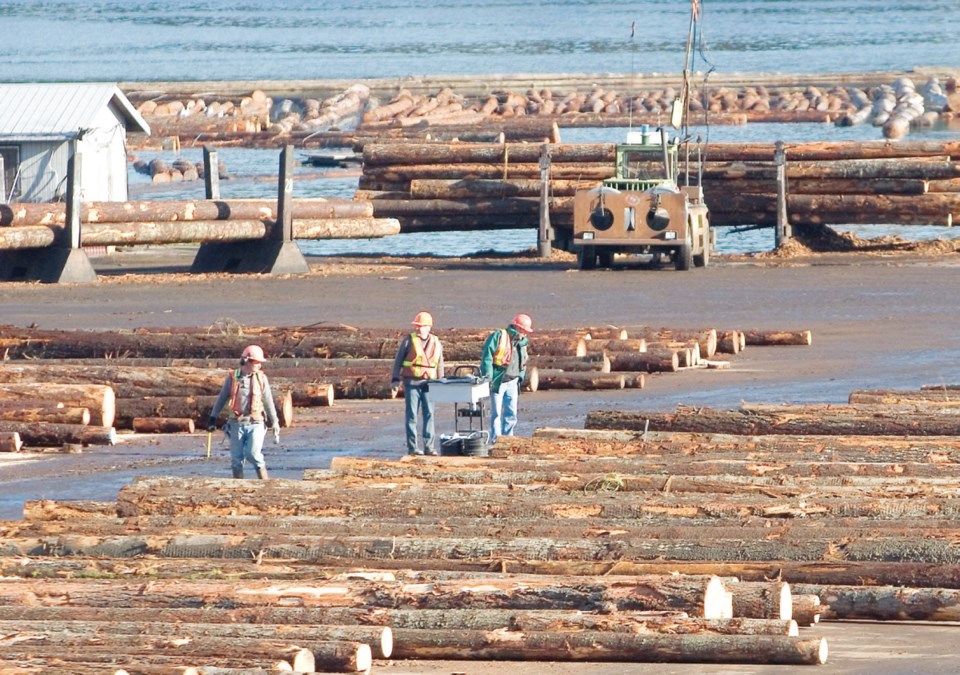A strike that has sidelined thousands of forest industry workers on Vancouver Island for the last two months appears no closer to resolution, with one side ratcheting up the stakes and the other digging in its heels.
Nearly 3,000 Western Forest Products employees and contracted workers at six Island manufacturing plants and timberlands around the coast have been on strike since July 1. And it appears they will stay there for the foreseeable future after the company sent notice this week it would no longer fund premiums to ensure the continuation of benefits for striking workers.
At the same time, the United Steelworkers Union reiterated its position that until the company changed its tune on concessions, little progress could be made.
“It will [end] at some point, but what it will take is WFP to realize the market doesn’t dictate the concessions they have on the table,” said Steelworkers Local 1937 president Brian Butler.
He said an attempt to get concessions on pension plans, security and a two-tiered wage structure are non-starters. “They will never get those kinds of concession out of the union. It will be a long, long strike before they will ever get something like that.”
Butler characterized the letter about benefit premiums, sent to employees Tuesday night, as an attempt to inflame the situation, and the union has called for the company to rescind the memo.
Butler said the company’s health and welfare plan is jointly trusteed [union and management] and there is an agreement that in labour disputes the company would fund the premiums and have employees repay it when they return to work.
“We say they are still bound to pay for benefits,” he said.
Susan Dolinski, Western’s vice-president of corporate affairs, said the company has been funding the premium since the strike started despite not being obligated to do so under the labour code. She said the code provides the option for the union to pay the premiums during a labour dispute.
“As the strike approaches a third month, we are not in a position any longer to front the cost, having done so for July and August,” she said. “We did delay the action as long as possible to allow [the Steelworkers] to maintain member benefits.”
When asked if she thought the action was about turning up the heat on the union, Dolinski maintained they remain open to negotiating a settlement.
“We have been earnest in our desire to get back to the bargaining table and negotiate a collective agreement that meets the interests of our employees, the organization and, of course, the community,” she said. “We are pursuing all avenues.”
Both sides of the dispute have had preliminary meetings with mediator Vince Ready. Butler said that isn’t necessarily a sign of imminent resolution, as both sides simply go in with their original bargaining positions.
“It’s not like the parties have narrowed their issues,” he said.
Dolinski maintains the strike comes at a challenging time for the company. “It is happening at a time of extremely weak markets and the strike will exacerbate the challenges for the organization,” she said, noting Western’s books are nowhere near as healthy as they were in 2018.
For the first half of this year Western posted earnings before income, taxes, depreciation and amortization of $33.2 million and a net profit of $1.4 million, down from EBITDA of $93.2 million and a profit of $48.8 million at the same time last year.
“We have seen declining revenues due to challenging lumber markets and declining prices, and we’ve seen costs increasing at the same time,” she said. “It’s a challenging period overall.”
But not before more pain.
Western, citing weak markets, cut shifts at three sawmills — Duke Point, Saltair and Chemainus — this year, and will shut down Ladysmith this week.
Ladysmith has not been affected by the strike to this point. It is staffed by members of a different union and the mill had been utilizing logs not tied up in the dispute.
Dolinski said it has operated longer than the company expected. “But now we’re getting close to the end of that supply and we will be taking that mill down this week,” she said.
That curtailment will affect 67 unionized employees represented by the Public and Private Workers of Canada.



